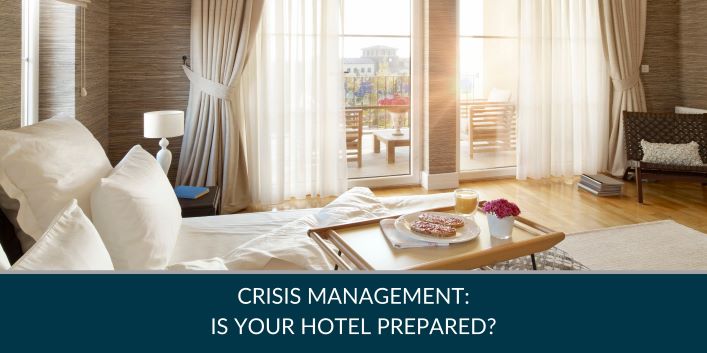When guests stay at your hotel, there are a lot of things you know they expect—a clean room, quality Wi-Fi, a large flat screen, comfortable bed, and a friendly staff ready to help if anything’s lacking. Those are the basics in today’s world and properties who want to capture repeat bookings do their best to deliver.
But there’s one feature that’s missing from that list and it’s just as fundamental to your guests’ comfort—peace of mind.
Every guest who chooses your hotel puts their trust and safety in your hands. It may not be something that’s at the forefront of their minds, but there is an unspoken assumption that your staff is equipped to handle emergency situations like natural disasters, hotel fires, and other crises. Are you confident in your property’s crisis management skills? If not, it’s time to get there.
Here are four of the most important factors to consider in Crisis Management. Once you have effective strategies in place, you’ll feel much better about delivering that peace of mind to your guests…and staff.
PLAN AHEAD
Having a solid emergency plan for all contingencies is probably the most critical aspect of crisis management. The plan should create a coordinated response among your team so staff members know exactly who to call, how to alert guests, what safety actions should be taken (evacuate, lock downs, etc.), and how to manage a panicked atmosphere.
FORM A CRISIS MANAGEMENT TEAM
Gather your core hotel employees and put together a Crisis Management Team. By giving staff members defined roles and responsibilities in emergency situations, you’ll have a more orderly, systematic approach to your plan. Ensure your entire staff has the name/number of the initial Emergency Contact(s) so help is alerted with no unnecessary lapse in time. Remember, seconds count in a crisis.
TRAIN & PRACTICE
Outline your plan and have training seminars to review the strategy in detail. Make sure to address your team’s concerns, listen to their suggestions, and let their voices be heard—these are the people your guests will turn to…they need to feel comfortable in their roles.
Have your team practice with bi-annual emergency drills. Yes, this may be time consuming and cost money in extra staff hours, but if a difficult situation arises, it will be well worth it. Remember, turning words into action is what really counts. After a drill, regroup with key staffers to review the drills, measure effectiveness and identify areas that need improvement.
STAY CALM
Hotels have high occupancy rates with a variety of guests—many who are young and elderly. When alarms go off or emergency notifications come in the middle of the night, panic is often the first emotion to kick in. And guests will be looking to your employees for guidance. If your team member is calm and self-assured in demeanor, he/she can alleviate guests’ fear and direct them to safety (according to your crisis management strategy). What is the secret to staying calm? Confidence. Employees who have a handle on emergency protocol and a good knowledge of your property’s layout will be more likely to keep their composure.
For more tips, visit the Ready.gov preparedness website. You could also schedule a meeting with your local fire station, talk to a police representative or hire a professional firm like 911 Consulting®(used by the Waldorf Astoria and Hyatt ‘s corporate HQ) or Aegis to build a custom plan for your property.
Does your hotel have a Crisis Management plan in place? Let us know what strategies your property is using!




